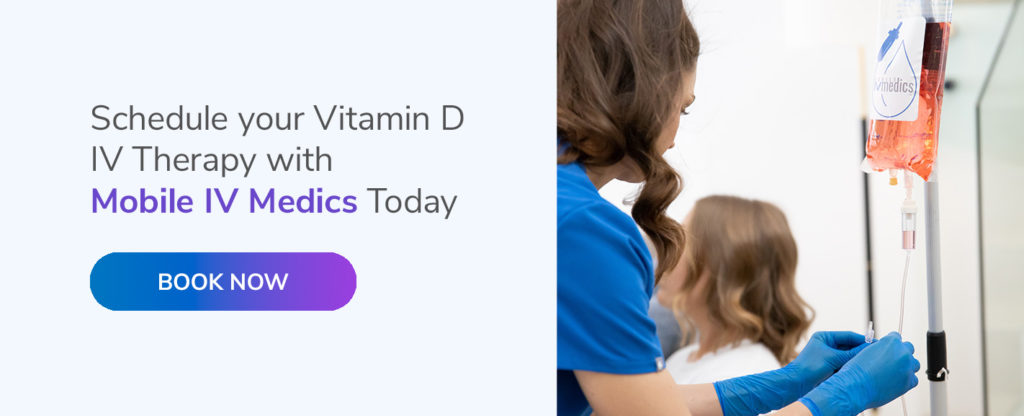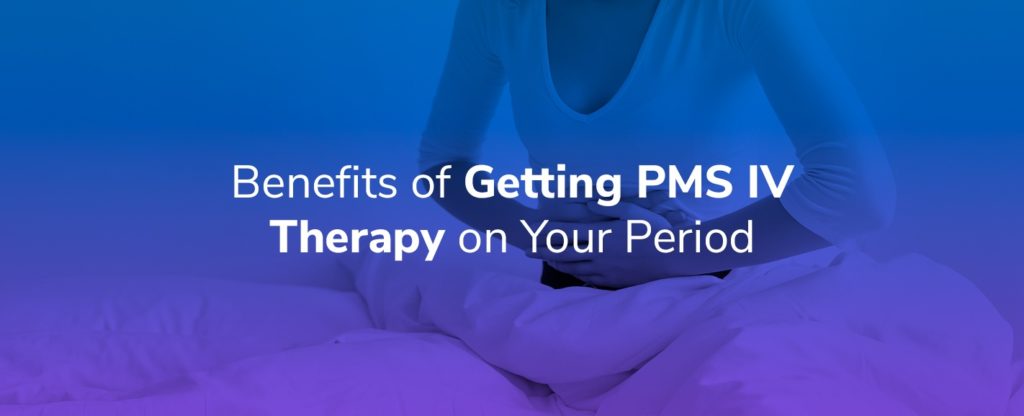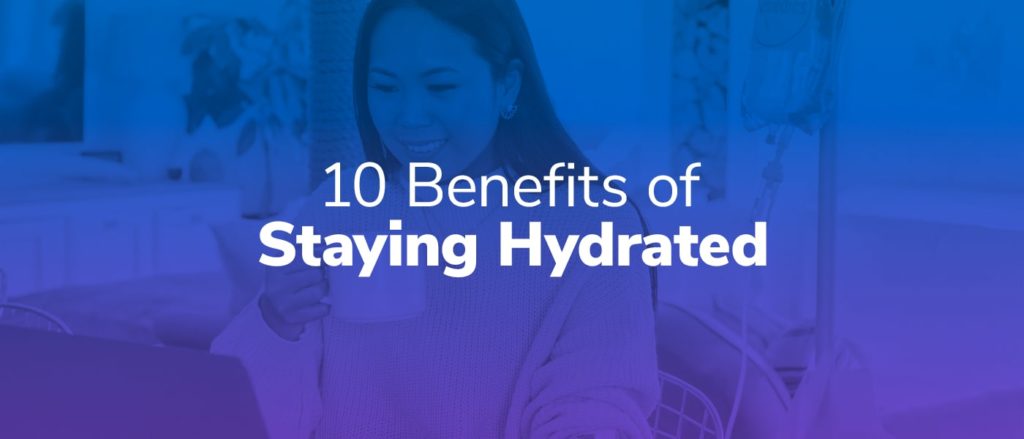While we all know that vitamins are vital substances your body needs to grow and function normally, we don’t always know why each vitamin is important. If you’ve ever wondered what vitamin D is, the benefits it offers and how to get vitamin D, you’ve come to the right place! Keep reading to learn more about this essential vitamin and how you can make sure you’re providing your body with enough of it.
- What Is Vitamin D?
- Why Do We Need Vitamin D?
- Top 7 Vitamin D Benefits
- What Is Vitamin D Deficiency?
- How to Get More Vitamin D Every Day
- Mobile IV Therapy to Increase Vitamin D
- Schedule Your Vitamin D IV Therapy With Mobile IV Medics Today
What Is Vitamin D?
Also known as calciferol, vitamin D is a fat-soluble vitamin that’s vital to maintaining your body’s normal processes. As a fat-soluble vitamin, vitamin D is present in foods containing fats. Vitamin D can also be supplied by certain fortified foods, dietary supplements and sunlight. Vitamin D is essential for helping the body absorb calcium, conduct normal cellular functions and carry out other physiological processes.
Why Do We Need Vitamin D?
Vitamin D is crucial for helping your body function at its highest capacity. In particular, vitamin D ensures your bones are strong and healthy by enabling normal bone mineralization and calcium absorption in the gut, which is key to supporting bone health. Vitamin D is also necessary for bone growth and bone remodeling to heal any bone injuries you may experience throughout your life.
Along with promoting bone health, vitamin D plays other key roles in the body. Here are the other ways vitamin D helps to keep you feeling your best:
- Supporting both the immune system and nervous system
- Reducing inflammation
- Assisting the cell growth process
- Promoting healthy teeth
- Regulating insulin levels, which especially helps with diabetes management
- Supporting glucose metabolism
- Aiding with lung function and boosting cardiovascular health
- Influencing the expression of genes related to cancer development
When you don’t get enough vitamin D, your bones can become brittle, thin or misshapen. When paired with calcium, vitamin D can help you maintain strong, healthy bones as you become older and more prone to bone conditions like osteoporosis. That means providing your body with enough vitamin D should be a top priority no matter how old you are.
Top 7Vitamin D Benefits
If you’re still uncertain of the health advantages vitamin D has to offer, here are seven extra benefits of getting enough vitamin D:
1. Promotes Strong Bones
Vitamin D is essential for regulating calcium and maintaining the appropriate levels of phosphorus in the blood. These factors are key for promoting healthy bones and sound skeletal structure. Specifically, vitamin D enables the intestines to stimulate and absorb calcium, helping your body reclaim valuable calcium that the kidneys would otherwise excrete. This calcium helps generate healthy bone growth and support.
2. Can Help Lower Your Chances of Catching the Flu
Research has found that vitamin D might offer protection against the influenza virus. The theory is that vitamin D may boost the immune response to infection to keep you flu-free. Although further studies are needed to confirm whether vitamin D can help you ward off the flu, it is possible that getting enough vitamin D in your system can reduce your risk of coming down with the flu.
3. Improves Weight Loss
Making sure you get enough vitamin D in your diet may help you lose weight and achieve your fitness goals faster. One study found that subjects who took a vitamin D and calcium supplement each day lost more weight than subjects who took a placebo supplement. The researchers propose that the extra vitamin D and calcium created an appetite-suppressing effect that helped the subjects eat less and lose more weight.

4. Reduces Depression
Scientific studies have shown that vitamin D may play a crucial role in regulating mood and preventing symptoms of depression. One study, in particular, found that those who had depression and routinely took vitamin D supplements saw a significant improvement in their depressive symptoms.
On the other hand, a separate study found that people who had fibromyalgia and were experiencing depression or anxiety were more likely to have a vitamin D deficiency. These findings suggest that maintaining the right levels of vitamin D is important for warding off feelings of depression and anxiety.
5. Helps You Fight Diseases
Studies have found that vitamin D may play a critical role in helping to fight off serious diseases. The diseases vitamin D can help you avoid include:
- Multiple sclerosis: One study found that high levels of vitamin D correlated with a lower risk of multiple sclerosis.
- Heart disease: Research indicates that vitamin D can help decrease your chance of developing heart disease. Other studies have found that overweight people who took a vitamin D supplement each day improved their heart disease risk markers.
- Osteomalacia: Getting enough vitamin D helps to keep your bones from softening due to a condition called osteomalacia. Osteomalacia is linked with poor bone density and muscular weakness. Similarly, you need adequate vitamin D to fend off osteoporosis, a condition in which the bones become porous and start to lose their density.
- Rickets: For children, getting enough vitamin D is key to preventing rickets, a condition that softens the bones and leads to a severely bowlegged appearance.
6. Promotes Healthy Pregnancy
Research has found that women who do not get enough vitamin D on a daily basis might have a higher risk of developing preeclampsia, a condition that involves rising blood pressure and swelling, often resulting in giving birth prematurely. Maintaining the appropriate vitamin D levels can also help pregnant women avoid bacterial vaginosis and gestational diabetes.
7. Supports Healthy Infants
Along with keeping expectant mothers healthy, vitamin D offers plenty of health benefits for infants. Low vitamin D levels have been linked to high blood pressure in children, along with stiffness within their arterial walls. Some studies have also found that getting enough vitamin D seems to be crucial for protecting children against developing an allergy.
What Is Vitamin D Deficiency?
Another way to consider the benefits of vitamin D is through the lens of what could happen if you don’t get enough vitamin D. A vitamin D deficiency can lead to serious health conditions. Most notably, a vitamin D deficiency is often associated with weak bones and skeletal deformities. However, a severe vitamin D deficiency can come with additional negative consequences.
Low levels of vitamin D in the blood have been connected with the following health risks:
- Severe asthma in children
- Cognitive impairment for older adults
- An increased risk of death from cardiovascular disease
- Cancer
The symptoms of a vitamin D deficiency are typically subtle, so it is important to be aware of how much vitamin D you get from your diet regularly. Whether through your diet or supplements, incorporating an adequate amount of vitamin D into your everyday routine is essential for keeping your body functioning at its best.
How to Get More Vitamin D Every Day
Fortunately, you can avoid a vitamin D deficiency by making sure you get plenty of vitamin D each day. Depending on your age and health conditions, the exact amount of vitamin D you need per day will vary. For example, those who already have a vitamin D deficiency will need to work more vitamin D into their daily routine than those who do not.
You increase your vitamin D intake by eating certain foods, spending more time in the sunlight or taking vitamin D supplements. Check out the sections below to learn more about how you can get more vitamin D in your day.
Vitamin D Foods
There are few foods that contain vitamin D naturally. Most of the foods that have a significant vitamin D content are animal-based foods. Animal-based foods usually provide vitamin D3 and vitamin D in the form of 25(OH)D, which is a remarkably potent form of the vitamin. While the amount of vitamin D found in an animal’s tissues depends on the animal’s diet, meat products are typically a decent source of vitamin D.
If you want to eat more foods that naturally contain vitamin D, put these items on your grocery list:
- Fatty fish: The fish liver oils and flesh of fatty fish like salmon, trout, tuna and mackerel are some of the best dietary sources for vitamin D.
- Meat: Beef, beef liver, pork, turkey and chicken are all excellent sources of vitamin D.
- Animal products: Animal products like egg yolks and cheese have smaller amounts of vitamin D because they come from the animal less directly. However, they still serve as a reliable source of naturally occurring vitamin D.
- Mushrooms: For vegetarians, mushrooms boast impressive levels of vitamin D. Some mushrooms even get treated with UV light to increase their vitamin D levels.
Along with the foods listed above that naturally contain vitamin D, many foods have been fortified with vitamin D to get more of the essential nutrient into the average American’s diet. Fortified foods are the source of most of the vitamin D in American diets.
Here are some of the most common fortified foods you can eat to up your vitamin D intake:
- Dairy products: Much of the milk supply in the United States is voluntarily fortified with vitamin D. Products made with milk, such as yogurt, cheese and ice cream, can also be fortified, although not as frequently.
- Plant milk alternatives: Just like regular milk, most plant milk alternatives, such as milk-like beverages made from almonds, oats or soy, are fortified with vitamin D.
- Cereal: Pre-packaged breakfast cereals usually contain added vitamin D to help people start their day with more vitamins and minerals.
- Orange juice: Certain brands of orange juice are fortified with vitamin D to help make your breakfast an even more nutritious meal.
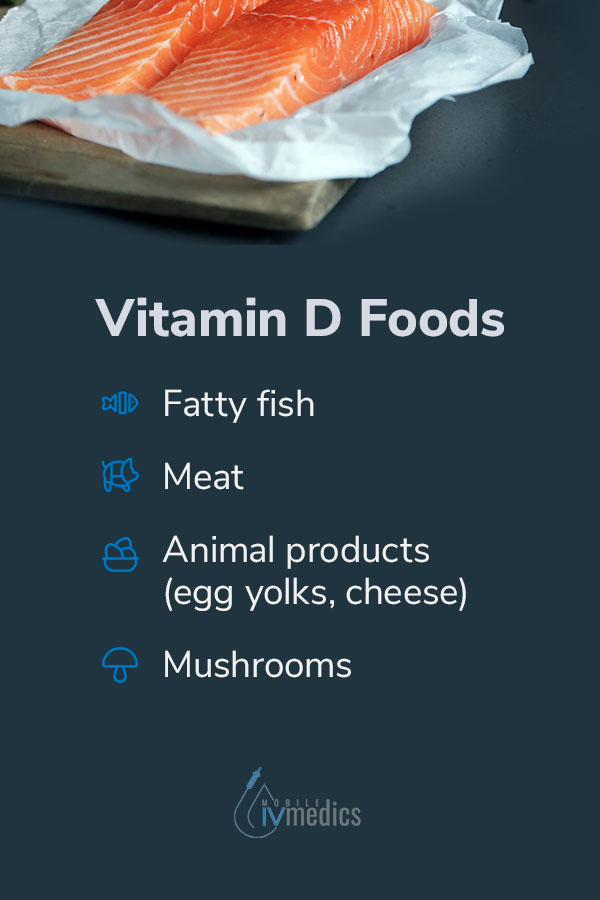
Sun Exposure
Sunlight is one of the main sources of vitamin D for most people in the world. Once a ray of sunlight hits your skin, it gets converted into vitamin D, which is why vitamin D is commonly referred to as the “Sunshine Vitamin.” However, variables such as the time of day, season, cloud cover, smog, sunscreen and skin melanin content can affect your body’s vitamin D synthesis process.
Although sun exposure is vital to providing your body with enough vitamin D, many people spend too much time indoors these days. In general, experts recommend trying to get up to around half an hour of sun exposure each day. Try to get your half an hour of sunlight in during the middle of the day when the sun is at its highest.
However, keep in mind that getting too much direct sunlight can also be dangerous. If you’re going to be staying outdoors in the sun for extended periods, it’s still a good idea to wear sunscreen.
Vitamin D Supplements
Getting enough vitamin D through your everyday diet and sun exposure can be difficult, especially during the colder months. If you’re eating all the right foods and spending time outside, but you still feel as if your vitamin D levels are low, you may want to start taking a vitamin D supplement. Taking a dietary supplement of vitamin D in capsule or gummy form can help you give your body the vitamin D boost it needs.
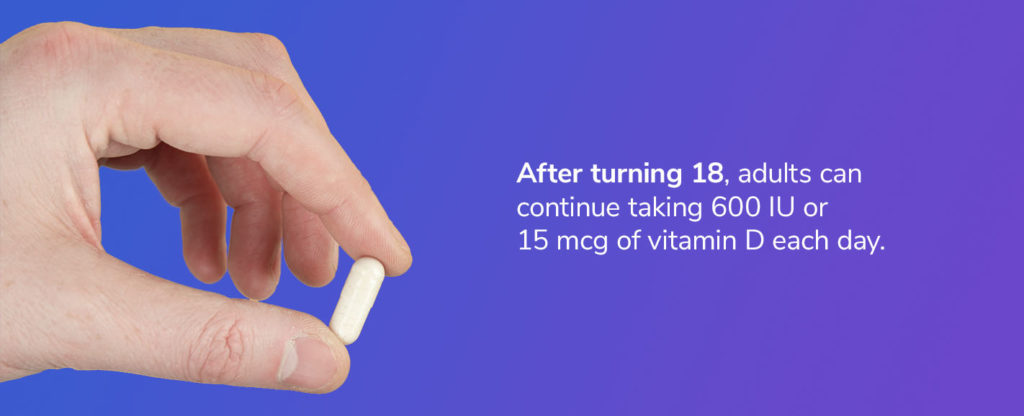
Vitamin D supplements are typically measured in either micrograms (mcg) or international units (IU). One microgram is the same as about 40 IU of vitamin D. If you’re not sure how much vitamin D you should take, check out these recommended daily vitamin D dosages for various demographics:
- Infants: Babies who are less than a year old should take 400 IU or 10 mcg of vitamin D.
- Children: Those under 18 should take 600 IU or 15 mcg of vitamin D.
- Adults: After turning 18, adults can continue taking 600 IU or 15 mcg of vitamin D each day.
- Older adults: Adults over the age of 70 should take 800 IU or 20 mcg of vitamin D.
- Pregnant women: Pregnant or lactating women should get the same amount of vitamin D as other adults — 600 IU or 15 mcg.
While these guidelines for taking a vitamin D supplement are a good rule of thumb, be sure to consult your doctor before starting a new supplement regime.
Mobile IV Therapy to Increase Vitamin D
Intravenous (IV) therapy is a straightforward and convenient way to deliver vitamin D directly to your bloodstream. Receiving vitamin D supplementation via IV therapy can have beneficial effects on your immune system’s functioning. Specifically, the vitamin D supplement can help your immune system regulate itself better and manage its inflammatory responses to ensure they do not become overactive.
You can add vitamin D supplementation to whatever IV package you would like to give your body a vitamin D boost along with your regular IV therapy package. A hydration IV package pairs especially well with a vitamin D add-in because the hydration IV package helps your body feel refreshed and ready to make the most of its nutrient supplies.
When you choose in-home IV therapy, all you have to do is book your appointment online and request whatever vitamin or medication add-ins you want to be included in your IV package, then wait for your treatment to arrive. A trained nurse will show up to administer your IV therapy efficiently and painlessly in the comfort of your own living room. After your IV session, you will feel more energized and ready to take on the day.
Schedule Your Vitamin D IV Therapy With Mobile IV Medics Today
If you’re ready to experience all of the health benefits that vitamin D has to offer, book your IV therapy appointment with Mobile IV Medics today. After you schedule your appointment, we will send one of our registered nurses to your home, office, hotel room or wherever else you prefer to receive your IV therapy.
To find out more about how adding vitamin D to your IV package could benefit you, contact us or book an appointment with Mobile IV Medics.
